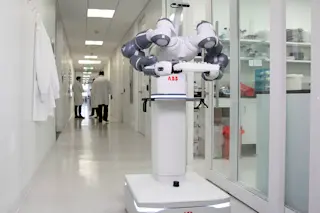When Michael Micci looks at a microwave oven, he sees not just the means to a ten-minute baked potato but a new way to power satellites. Micci, an aerospace engineer at Penn State, has made the heating unit from an ordinary 1,000-watt microwave oven the heart of a prototype rocket engine he’s building in his lab.
Conventional rockets in space must carry their own oxygen supply, usually in liquid form, to burn their fuel. This can be a costly--and hazardous--affair. To avoid lugging extra weight into orbit, satellites have been built that use electricity instead of combustion to heat and expand the fuel, creating the pressure that forces the propellant out the rocket nozzle. But the fuel itself tends to eat away at the exposed electrodes supplying the electricity, greatly limiting the life of the engine.
Micci’s rocket engine, called the Microwave Arcjet Thruster, avoids such problems. It heats its ...














